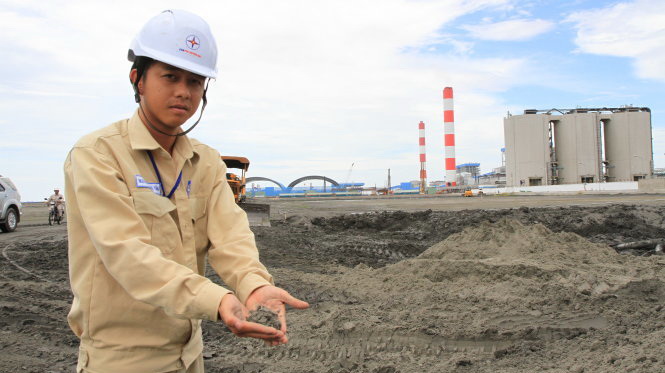A thermoelectricity power plant in the Mekong Delta province of Tra Vinh has been in operation for the past ten months despite lacking proper paperwork and posing high environmental risks
The Vietnamese Ministry of Industry and Trade in October announced a list of major projects and factories in the country which pose high pollution risks, nearly half of which are thermoelectricity plants operated by state-owned energy and oil giants Vietnam Electricity (EVN) and Vietnam Oil and Gas Group.
Despite earning a spot on the list for its lack of environmental protection certification, EVN-run Duyen Hai 1 Thermal Power Plant in Tra Vinh Province has been in operation for the past ten months.
According to the plant’s 2009 approved environmental impact report, fly ash collected from burnt-out coals used to fuel the plant’s turbines should be stored in wet-bottom ponds.
However, Tuoi Tre (Youth) newspaper’s observation of the plant’s 39-hectare landfill on a late October day proved otherwise, as fleets of dump trucks were spotted transporting dry ash from three high-rising silos directly into a dumping area.
Located close to the coastline, the landfill currently holds over one million metric tons of dry coal ash after only a ten-month run.
Au Nguyen Dinh Thao, deputy director of Duyen Hai Thermal Power Company, confirmed to Tuoi Tre that the plant was indeed using a dry ash handling method, contrary to its initially approved design plan.
An EVN representative attributed the change to insufficient water supply and limited land area, adding that the dry method actually improves the ash’s reusability and eliminates environmental risks.
A letter sent out by EVN in response to queries on the issue stressed that the change had been approved by the Vietnam Environment Administration under the Ministry of Natural Resources and Environment (MONRE). The ministry later revoked the approval by its lower body.
The MONRE also failed to explain why Duyen Hai 1 Thermal Power Plant was given the green light to operate while its environmental protection facilities were still unfinished.
Do Dien Tai, deputy director of the Third Thermal Power Projects Management, confirmed that the plant lacks proper approval for its environmental facilities, the certification required by law in order for a power plant to be eligible for operation.
“The paperwork is only a matter of procedure. All technical measures by ministerial experts of the emissions, smoke, and dust generated by the plant were found to be within the allowable limits,” Tai explained.
Duyen Hai 1 Thermal Power Plant was also found to be dumping 4.8 million cubic meters of wastewater a day into the ocean, though the plant was never granted permits by the MONRE to use the available water resource or discharge wastewater.
Wastewater samples were taken by experts from the ministry to test for safety indicators, but Tuoi Tre’s questions regarding test results have gone unanswered.
Like us on Facebook or follow us on Twitter to get the latest news about Vietnam!






















































